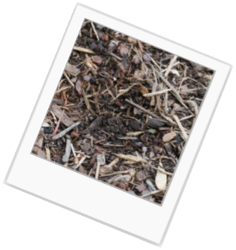Worm Castings Improve Mulch Benefits Exponentially
Insulate Your Plants from Summer Heat and Winter Cold
 Mulching your garden, landscaping, and trees is easy with local resources, often for free when you do your own yard work. Worm castings improve mulch benefits exponentially. All you have to do is use worm castings for mulch.
Mulching your garden, landscaping, and trees is easy with local resources, often for free when you do your own yard work. Worm castings improve mulch benefits exponentially. All you have to do is use worm castings for mulch.
Homegrown mulch is easy to come by. You can use any yard scraps you have: leaves, stalks from plant trimmings, grass clippings, hay (may contain weed seeds so use with proper caution), or you can make your own wood chips if you have a chipper or if you do not, you can rent one fairly inexpensively. (Around $50 for four hours, provided you can transport it yourself.)
Other options are mimicking the layering that occurs naturally on a forest floor by laying whole twigs, sticks and leaves over your soil. You can then layer this with dried leaves or more soil if you like, following the Hugelkultur technique. As with wood chip mulch, rake away from your soil beds come spring.
Cover Crops Can Be a Gardener’s Best Friend
Sowing cover crops in fall is also a mulching alternative. Cover crops are highly beneficial to vegetable gardens, providing a diversity of nutrients and sowing the soil with depleted minerals and vitamins. This practice, in combination with a 33% vermicompost mixture can significantly increase your plant production and yields next season. Worm castings improve flowers drastically.
Typical cover crops include several kinds of grasses like winter rye, winter wheat and oats. Before your planting season in spring, cut, trample, or roll the grass before the kernels in the grain heads plump. If these grain heads are allowed to mature and shatter, you will reseed the crop.
Why Mulch? Benefits vs. Detriments
The purpose of mulch is to act as a barrier, keeping sunlight and cold air away from the soil surface.
PROS and CONS of Mulching
| PROS | CONS |
|
|
|
|
|
|
|
|
There are usually some pros and cons to mulching, but luckily our all-natural vermicompost naturally reduces the cons while adding to the pros.
Don’t Mulch without Worm Castings!
Monitoring your ground temperature come spring is essential no matter what for thawing the ground and airing the soil. The true benefit of worm castings, however, is to prevent unwanted pests from nesting in and under your mulch. Vermicompost naturally contains an enzyme known as Chitinase. This enzyme, when exposed to the exoskeleton and other invertebrate exteriors, begins to dissolve the pest’s external shell or skin. These pests will quickly move along or die trying.

